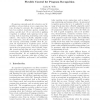612 search results - page 71 / 123 » An Empirical Study of Agent Programs |
WCRE
1993
IEEE
14 years 1 months ago
1993
IEEE
Recognizing commonly used data structures and algorithms is a key activity in reverse engineering. Systems developed to automate this recognition process have been isolated, stand...
RAID
2009
Springer
14 years 3 months ago
2009
Springer
Abstract. In order to detect a compromise of a running process based on it deviating from its program’s normal system-call behavior, an anomaly detector must first be trained wi...
GECCO
2007
Springer
14 years 3 months ago
2007
Springer
I present MOSES (meta-optimizing semantic evolutionary search), a new probabilistic modeling (estimation of distribution) approach to program evolution. Distributions are not esti...
CADE
2010
Springer
13 years 10 months ago
2010
Springer
Automated software verification and path-sensitive program analysis require the ability to distinguish executable program paths from those that are infeasible. To achieve this, pro...
AAAI
2004
13 years 10 months ago
2004
Learning reusable sequences can support the development of expertise in many domains, either by improving decisionmaking quality or decreasing execution speed. This paper introduc...

